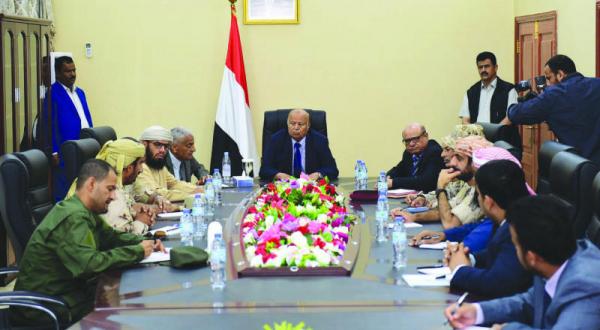Yemeni Presidential Advisor Sheikh Abdul Aziz al-Muflihi exhorted the Houthi insurgents and the ousted former President Ali Abdullah Saleh to surrender on a military level.
The surrender request came after pro-legitimacy forces arrived at the gates to Sana’a near Al Hudaydah and Hajjah Governorates in a chance to avoid bloodshed.
The second Yemen peace talks in Geneva have failed miserably, and the insurgents are in a tight situation in account of the political and military standings, al-Muflihi added. Insurgences don’t have their lines in order, there are two parties, Houthis on one side, and the General People’s Congress siding with the deposed Saleh on the other.
Ismail Ould Cheikh Ahmed, U.N. special envoy to Yemen must see it upon himself, during his visit to Yemen, to meet with the insurgents in Sana’a to discuss the full implementation of resolution 2216, al-Muflihi added.
U.N. special envoy Ahmed had returned to Yemen in light of the escalating developments on battle fronts with the pro-legitimacy and Popular Resistance forces knocking on the doors to the capital city. Political sources revealed that Ahmed has boarded over to Yemen for the purpose of resuming the negotiations between the legitimacy, Houthis, and Saleh.
Negotiations on the subject were held with Deputy Prime Minister and Foreign Minister of Yemen Abdulmalik Al-Mekhlafi in Riyadh.
The U.N. envoy’s visit to the region in the meantime poses many questions on its intention and timing. Especially that the visit coincide with the legitimacy forces advancing towards the capital. The Yemen Army and Popular Resistance have taken control over zones in the Hajjah Governorate and are making their way towards the coastal region of Hudaydah governorate, which is the strategically significant area to Sana’a.
Spokesman of the Popular Resistance in Sana’a Abdullah al-Shandaqi told Ashraq Al-Awsat that envoy Ahmed’s visit to Riyadh is not completely acquitted. Nonetheless, he confirmed that the
resistance is with any positive role playing in Yemen, whether it is the U.N. or international forces.
Alternatively, the resistance also refuses any negative effect, inflicted whether by the U.N. or anyone else, which harms Yemen. The negative effect is in reference to endeavors on reviving Houthi militia and gangs of the ousted Saleh, saving them at a time they have clearly proved unresponsive to previous deliberations and did not show any signs of good intentions. Insurgents have continuously shut down any chance for discussions.
Houthis along with the rest of anti-legitimacy powers had bet on regional and international parties, yet all their bets have fallen. Houthis have also violated all agreements struck with them, including what has been reached under U.N. sponsorship during the recent peace talks.
Houthis have refused to follow through with the trust building conditions they struck accord to, such as freeing the political detainees they are keeping and allowing aid trucks and humanitarian aid to starved and war-torn cities, al-Shandaqi clarified.
The Houthis have revoked the peace talk agreements as soon as they returned to Sana’a, furthermore, the U.N. envoy has tracked them down to check what was happening, yet has failed to get the Houthis to stick to the accord. Resistance’s Spokesman al-Shandaqi has stressed that the Houthis proved that they cannot be trusted which deems every possible settlement to failure.
Field wise, eye-witnesses and sources across several Yemeni governorates have reported that Houthi militias are transferring combatants from Sana’a to fight on fronts in Taiz and other battle zones, as to restrict clashes to the east side of the city. The process of shifting militants coincides with the failed militia attempts on urging clan heads to recruit more insurgents.

